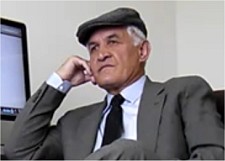"Oh, they think highly of me," he
replied. "I am a household word."
"In what way?"
He laughed as he replied, showing
his gold teeth, "Why, in Luristan if a child cries the mother says, 'Hush or
Amir Ahmadi will get you'." (2)
There are no records explaining why the Persian
people treated the Medes (Kurds, Lurs, Taylish, and others whom are calling
themselves Medes) and other Aryan people in such a horrendous and inhumane way. Even
if they once existed and were destroyed by either the victims or the perpetrators,
no international court will ever deal with the atrocities noted above. Left
alone to integrate them into their national consciousness, the Kurdish people continue
resisting their enemies who seek to spill more of the Aryan blood that they
share.
However the unity of today's Kurdish people under the
teachings of their leader, Abdullah Ocalan, heralds rescue from the torment that
has dogged them for so long. The ancient Medes had the power to exterminate the Persians in the past
but they chose not to. Spanning the age of the Medes till the present, a long-hidden but very timely prophecy in the Jewish Tanakh has predicted that in a
relatively short time, today's Medes will return to lead the Aryan people again
under the unique banner of Emperor Cyaxares, who upheld the efficacy and
dignity of the common man and woman, instead of base, wealth-focused
self-interest. Most significantly, their new order, like the old one, will be
marked by a refusal to enact an annihilation revenge program as payback for the
last 2500 years of abuse by Persians and others.
A
long time ago the Medes (Kurds) were a super power like the USA of today. Their
return to the world stage under the leadership of Abdullah Ocalan and his liberating
doctrines will bring about a unity amongst the Kurdish people that will not
suffer the delaying tactics of other figures such as Massoud Barzani and
Nawshirwan Mustafa. The Jewish prophet Isaiah
accurately predicted the rise of the Medes in his era, but like most prophecies
it has other applications. How do we know that it is about today's Kurds? Isaiah
used apocalyptic language to describe the predicament of earth's inhabitants
now. Around seven hundred years later in his last portent of irreversible and
permanent global change, the exiled Christian prophet John described the battle
lines drawn between the beastly ways of unrecognisably distorted humanity and those
marked by the image of mercy and justice. Under the pressure of
occupiers, the Kurdish people are uniting under a restored image in their final
struggle for their Median lands, culture, and rights to their ethical integrity.
Isaiah noted the ancient Medes' disdain for silver
and gold. In those days they considered the tribute already accorded them sufficient;
they saw no need for more, allowing the popular King Cyaxares to use the
resources not only to protect his empire, but to benefit and prosper his
people. Now, PKK members under the
leadership of Abdullah Ocalan have also set aside regard for silver and gold, and
refuse to be bribed.
Like John, Isaiah also emphasized the fall of
Babylon and its material and political power. Today, weakened by intractable
internal strife, the former ancient imperial center of Iraq faces a demise
rooted in the original narcissistic perceptions of King Nebuchadnezzar. Unless
his Arab successors implement the spirit of Nebuchadnezzar's reforms, they will
likely find themselves in an undesirable position on the battle field.
Now, the war in Syria between the YPG forces
of the Kurdish people and the Islamic terrorist organizations Jabhat al-Nusra
and the Islamic State of Iraq and the Levant (ISIS) marks the beginning of the final
war between the Aryan Kurds and the African Arab occupiers of Aryan lands. While
maintaining proactive presences in Turkey, Iran, and Iraq, the Kurds are prepared
for any level of intensity in this war. As the pressure of hunger on the Medes
(Kurds,
Lurs, Taylish, and others) and other Aryans of the Middle East and Asia increases
day by day, Persians, Arabs and Turks continue to kill Kurds and destroy
Kurdistan. From Maku to Chaharmahal and Bakhtiari of Iran, people are living in
a state of war without jobs and work to do while the Islamic Republic of Iran
steps up its abuse of them. When these extremes finally blow the Middle Eastern
lid so tightly kept in place by the superpowers and their allies, the prophecy
of the Medes' return will be fulfilled as the Aryan people of Iran join the Aryan
Kurds' revolutions in Turkey, Syria, and Iraq.
(Note: You can view every article as one long page if you sign up as an Advocate Member, or higher).





